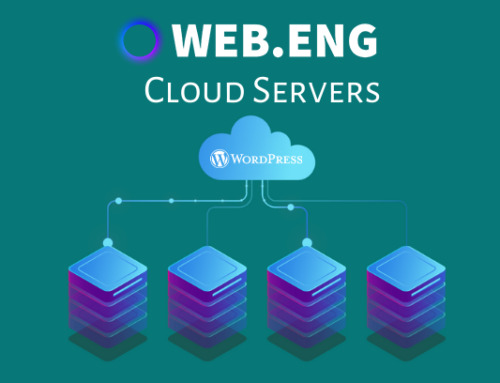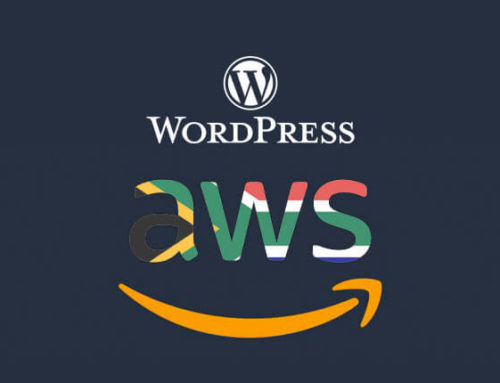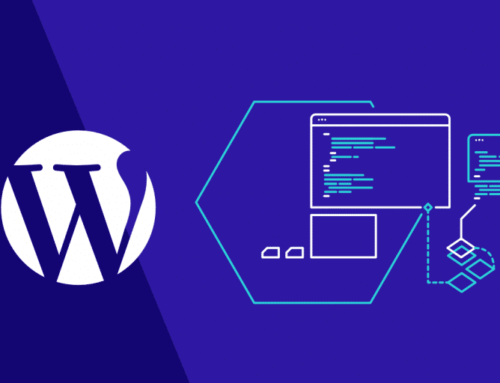Cloud computing is the on-demand delivery of computing services. These computing services are delivered over the internet and usually with pay-as-you-go pricing. The services include IT resources such as computing power, databases, storage, and software.
Cloud computing is becoming a conventional technology and more and more enterprises are using it because of the multiple benefits it offers. There are although a lot of organizations that still run their workloads on-premises because they are unaware of the ongoing growth and innovation of cloud computing services that arrive daily. Cloud computing can be up to 40 times more cost-effective than running an on-premises IT system (Hosting tribunal, 2020).
Cloud computing is definitely a complex technology and we want to help you understand the different types of cloud computing available as well as talk about cloud computing deployment models. We will also discuss the different types of cloud services available.
Main Types of Cloud computing:
There are three main types of cloud computing:
- Infrastructure as a Service (IaaS)
- Platform as a Service (PaaS)
- Software as a Service (Saas)
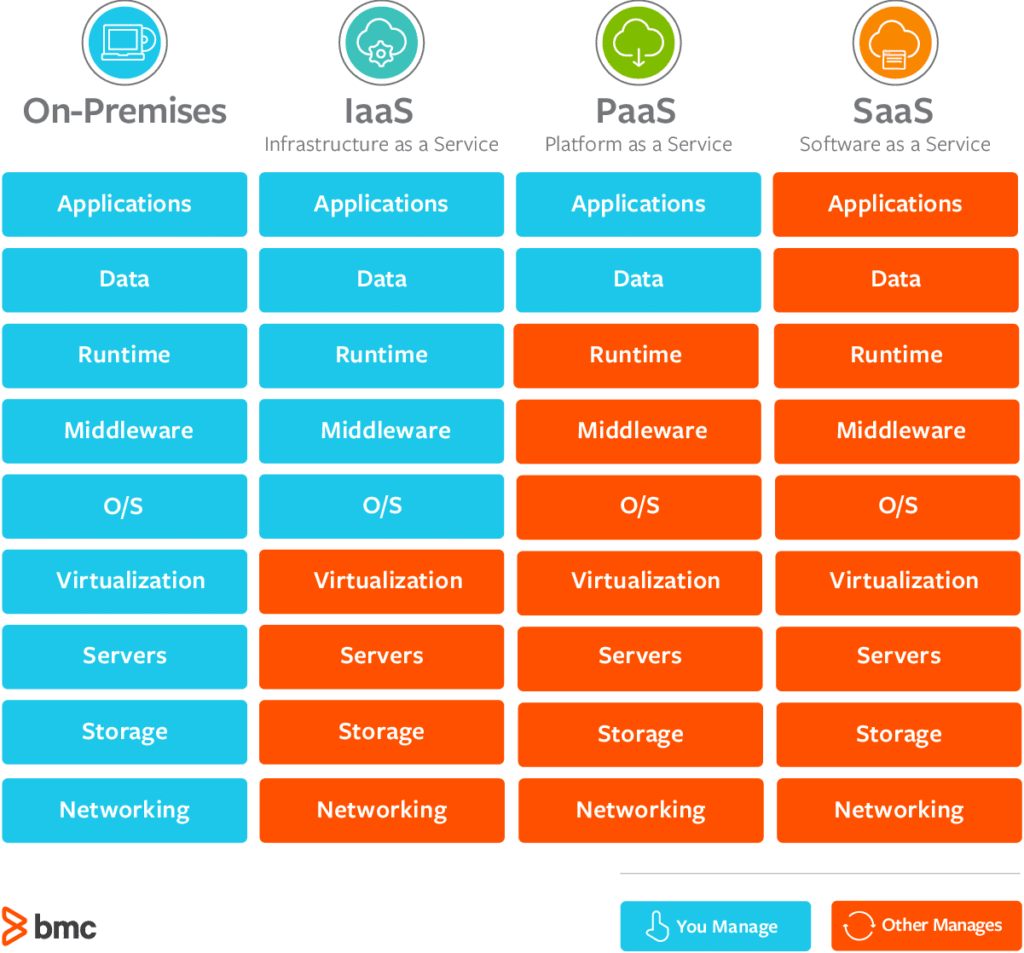
Figure 1: bmc.com
Infrastructure as a Service (IaaS)
IaaS is the most basic type and allows for the rent of IT infrastructures. This can include physical or virtual servers, storage, and networking. IaaS gives you access to advanced hardware resources and can be set to meet your organization’s specific processing and storage requirements. All this without the responsibility of managing and maintaining it.
An example of an IaaS will be a combination of virtual machines and storage disks that are customized to meet the requirements of your organization.
Platform as a Service (PaaS)
PaaS offers everything IaaS offers (physical or virtual servers, storage, and networking) combined with software tools. This is mainly used for application development. The software tools include operating systems, middleware, database management as well as some development tools.
The big advantage PaaS offers is not having to worry about the complexity of managing the different software tools. You do not have to waste time on installing and configuring infrastructure but rather focus only on the development of applications.
Software as a Service (SaaS)
SaaS offers complete software applications that are run and managed by the service provider. These applications are delivered over the internet and are usually on a subscription basis. With SaaS, the service providers host, manages, handles maintenance and upgrades. Netflix is an example of a SaaS that offers users to watch licensed videos on demand through a subscription plan.
Cloud Computing Deployment models:
There are three different cloud computing deployment models, namely, on a public cloud, private cloud, or hybrid cloud.
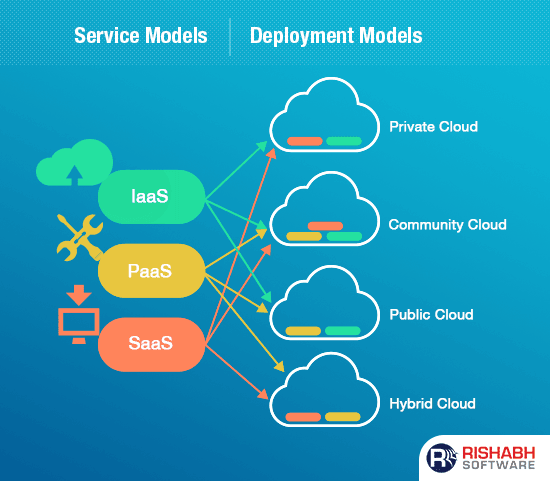
Figure 2: RISHABH software
Public cloud:
This is the most common type of cloud computing. All resources (hardware, software, and other supporting infrastructures) are owned and run by a third-party service provider and delivered via the internet. With a public cloud, resources are shared with other organizations or cloud users. A web browser is used to access these resources and manage your account. This is mostly used for web-based email, online office applications, storage, and development environments (Microsoft, 2020).
In a public cloud deployment, the provider is responsible for the management as well as the maintenance of the system. These services are available to everyone and can be free or used on a subscription basis. The architectures of public and private clouds may be similar, the security requirements differ significantly.
Private cloud:
With a private cloud, the cloud computing resources are exclusive and only available to one business or organization. This cloud can either be on-site at the user or hosted by a third-party service provider. A private cloud makes it possible for organizations to customize their resources to meet different IT requirements. The cloud also ensures a high level of control and privacy (Microsoft, 2020).
This sort of deployment is typically used by organizations where compliance is a requirement. Using a private cloud does come with its disadvantages. These disadvantages include slow deployment and staffing, management, and maintenance costs.
Hybrid cloud:
A hybrid cloud is a combination of a private and public cloud and offers greater flexibility. It allows for the option of moving data and applications between two environments. Using a hybrid cloud gives organizations the capability to upscale and make use of the public cloud when their private cloud overflows. Confidential data can still be kept in the organization’s data centers while running certain workloads on the public cloud (Microsoft, 2020).
Other cloud Deployment Models
Besides the three main cloud deployment models there are some unfamiliar ones:
Community Cloud
This deployment model is typically used when several organizations have the same needs. One of the benefits of using a community cloud is that costs can be split between the different organizations involved.
Distributed Cloud
The distributed cloud is connected through a single network but formed from a vast majority of machines over numerous geographical locations. This is either created using volunteered assets or a public asset.
Multi-Cloud
Multicloud is the combination of multiple cloud service providers combined into a single diverse cloud deployment model.
Poly Cloud
Poly cloud is made up of a group of cloud deployments received from different service providers used to support specific services. A poly cloud differs from a multi-cloud because it enables you to accomplish more than using a single provider.
HPC Cloud
HPC cloud deployment models are specifically used for High-performance computing (HPC) applications, this is typically used for large scale research and solving complex problems.
How Many Types of Cloud Services Are There?
Every cloud service model consists of hundreds of different cloud services one could choose from. This is not an easy choice as the different options increase almost weekly. Different service providers offer different varieties of cloud services one could choose from.
The three superior service providers currently are Google Cloud, Amazon Web Services, and Microsoft Azure. They all offer a vast variety of different cloud services to meet your needs.
Below we discuss the core cloud service categories that you can choose from.
Core Cloud Service Categories
Cloud Compute Services
Compute Services forms the base of the infrastructure on which your IT services are built and run. The main element of computer service is established through Virtual Machines (VM). A wide range of VM options are provided by cloud service providers. These VM can be designed for your needed specifications and changed daily to satisfy your requirements.
Below are some of the main cloud computing services the three superior providers offer:
- Google Cloud: Compute Engine, Migrate for Compute Engine and App Engine.
- Amazon Web Services: Amazon EC2, Amazon Elastic Container Service, and Amazon LightSail.
- Microsoft Azure: Virtual Machines, Container Instances, and App Service.
Cloud Networking Services
Another important aspect of your cloud service experience is the networking infrastructure of the service provider you use. The availability, level of security, speed, and reach of your cloud services will be dependent on this.
The advantage of using one of the leading service providers is that they are always aiming to better their network infrastructure to allow for faster bandwidth and download speed.
Cloud networking is composed out of the following services:
- Virtual Private Network (VPN) – This allows for secure connections over the internet.
- Content Delivery Network (CDN) – also known as a content distribution network, its main goal is to provide content through multiple geographical locations.
- Dedicated Interconnection – Allows users to direct access to the service provider’s high-speed network.
- Domain Name System (DNS) – A way to refer users to different internet applications.
- Load Balancing – an application that balances traffic across numerous resources.
What makes the Google Cloud platform even more distinctive than the rest is they offer a Premium Network Tier. This allows you to access Google’s high performance, low latency, and extremely reliable global network.
Below are some of the main cloud computing services the three superior providers offer:
- Google Cloud – Virtual Private Cloud (VPC), Cloud DNS, Cloud CDN, Cloud Load Balancing, etc.
- Amazon Web Services – Amazon VPC, Amazon Route 53, AWS Direct Connect, Elastic Load Balancing, etc.
- Microsoft Azure – Azure Virtual Network, Azure DNS, Azure Content Delivery Network, Azure Load Balancer, etc.
Cloud Storage Services
Cloud Storage Services offers you to use the resources of a cloud service provider to safely store data, apps, and workloads. This can be customized to your demands and configured to the specific requirements of your business. These configuration options include the amount of storage, disk size as well as location.
The service providers will also offer the different storage types, namely, block, file, and object storage. They will also support you with data transfer services that will help you to transfer your data securely into their infrastructure.
Below are some of the main cloud storage services the three superior providers offer:
- Google Cloud – Cloud Storage, Persistent Disk, Cloud Filestore, Data Transfer Services, etc.
- Amazon Web Services – Amazon EBS, Amazon EFS, Amazon S3, Data Transfer Services, etc.
- Microsoft Azure – Disk Storage, File Storage, Blob Storage, etc.
Cloud Security, Identity, and Compliance Services
These security, identity, and compliance services are all resources designed to control access to your cloud infrastructure, protect your workload against attacks, and ensure privacy.
Listed below are some of the typical functions cloud services include:
- Auditing
- Compliance
- DDoS Protection
- Encryption
- Firewalls
- Identity and Access Management
- Threat Detection
Below are some of the main cloud security services the three superior providers offer:
- Google Cloud – Cloud IAM, Cloud Audit Logs, Cloud Security Command Center, etc.
- Amazon Web Services – Amazon Cognito, AWS Shield, AWS Security Hub, AWS Firewall Manager, etc.
- Microsoft Azure – Azure Active Directory, Key Vault, Azure Security Center, etc.
Cloud Analytics Services
These services are made to help you store, process, analyze, and visualize your data. The leading cloud providers know how important analytic software is to a business and therefore offer platforms that has integrations with open source analytical tools like Apache Spark and Apache Hadoop.
Below are some of the main cloud analytics services the three superior providers offer:
- Google Cloud – BigQuery, Cloud Dataflow, Google Data Studio, etc.
- Amazon Web Services – Amazon Athena, Amazon EMR, Amazon Redshift, etc.
- Microsoft Azure – Data Lakes Analytics, HD Insight, Azure Synapse Analytics, etc.
Cloud Database Services
These services include purpose-built databases that can be designed specifically to meet the requirements of your organization. The advantage of cloud databases is that they are fully managed. This will allow you to analyze and utilize your data without worrying about the underlying infrastructure.
The different service providers offer relational and non-relational (NoSQL) databases that will meet your specific data needs. These options include MySQL and MariaDB. The cloud will offer general SQL Server databases for traditional applications as well as wide column databases for high scale applications.
Below are some of the main cloud analytics services the three superior providers offer:
- Google Cloud – Cloud SQL, Cloud Bigtable, Cloud Spanner, etc.
- Amazon Web Services – Amazon RDS, Amazon DocumentDB, Amazon Managed Apache Cassandra Service, etc.
- Microsoft Azure – Azure SQL Database, Azure Cosmos DB, Azure Database for MySQL, etc.
Emerging Cloud Service Categories
There are three evolving cloud services that are already popular all over the world, namely, AI and Machine learning cloud services, Blockchain, and the Internet of Things (IoT).
AI and Machine Learning Cloud Services
You have definitely heard about AI and machine learning. These are any technique which enables computers to mimic the behavior of humans and learn without human programming the computer to do so.
These AI and Machine learning services are available for a vast range of different needs. These services offer extreme advantages when it comes to customer services, marketing as well as sales. Learning how your business runs and where you can grow.
Listed below are some of the typical AI and machine learning services:
- Chatbots
- Recognition
- Speech to Text
- Search Engines
- Translation
Below are some of the typical AI and machine learning that is offered through the three superior providers offer:
- Google Cloud – AI Platform, Vision AI, Speech-to-Text, etc.
- Amazon Web Services – Amazon Comprehend, Amazon Polly, Amazon Translate, etc.
- Microsoft Azure – Azure Bot Service, Bing Custom Search, Machine Learning Studio, etc.
Blockchain
Blockchain, also called Distributed Ledger Technology, is defined as a decentralized, distributed register that records the origin of a digital asset.
How blockchain works step by step:
- User requests a transaction.
- The transaction is created and represented through a block.
- The block is then broadcasted to the different nodes of the network.
- The block then needs to be validated by the different nodes and in return validate the transaction.
- The block is then added to the chain.
- Finally, the transaction is verified and executed.
The cloud service providers offer services where you can build and manage your own blockchains.
Below are some of the typical blockchain services that are available through the three superior providers offer:
- Amazon Web Services – Amazon Managed Blockchain and Amazon Quantum.
- Microsoft Azure – Azure Blockchain Service, Azure Blockchain Workbench, and Azure Blockchain Tokens.
Internet of Things (IoT)
The Internet of Things is described through objects connected to each other with sensors, software, and all kinds of technologies for the purpose of interaction over the internet.
When using IoT devices it is important to connect them in a secure way that will ensure your data is safely managed. Cloud service providers offer numerous solutions that will help you.
Below are some of the typical IoT services that are available through the three superior providers offer:
- Google Cloud – Cloud IoT Core and Edge TPU.
- Amazon Web Services – AWS IoT Core, AWS IoT Button, AWS IoT Analytics, etc.
- Microsoft Azure –Azure IoT Hub, Azure IoT Central, Azure IoT Edge, etc.
Conclusion
If you have not realized by now, the cloud offers numerous Infrastructure, Platform, and Software as a Service solution for you to choose from. You can also choose if you want to deploy these solutions either in a public, private or hybrid cloud. The best thing about the different solutions is that they can be customized to suit your unique business needs. You need to make an educated decision on what the best solution is for your organization.
References
Hosting tribunal. (2020, November 24). What Is Cloud Computing? A Comprehensive Beginner’s Guide. Retrieved from Hosting tribunal: https://hostingtribunal.com/blog/what-is-cloud-computing/#gref
Microsoft. (2020). What are public, private, and hybrid clouds? Retrieved from Microsoft Azure: https://azure.microsoft.com/en-us/overview/what-are-private-public-hybrid-clouds/











